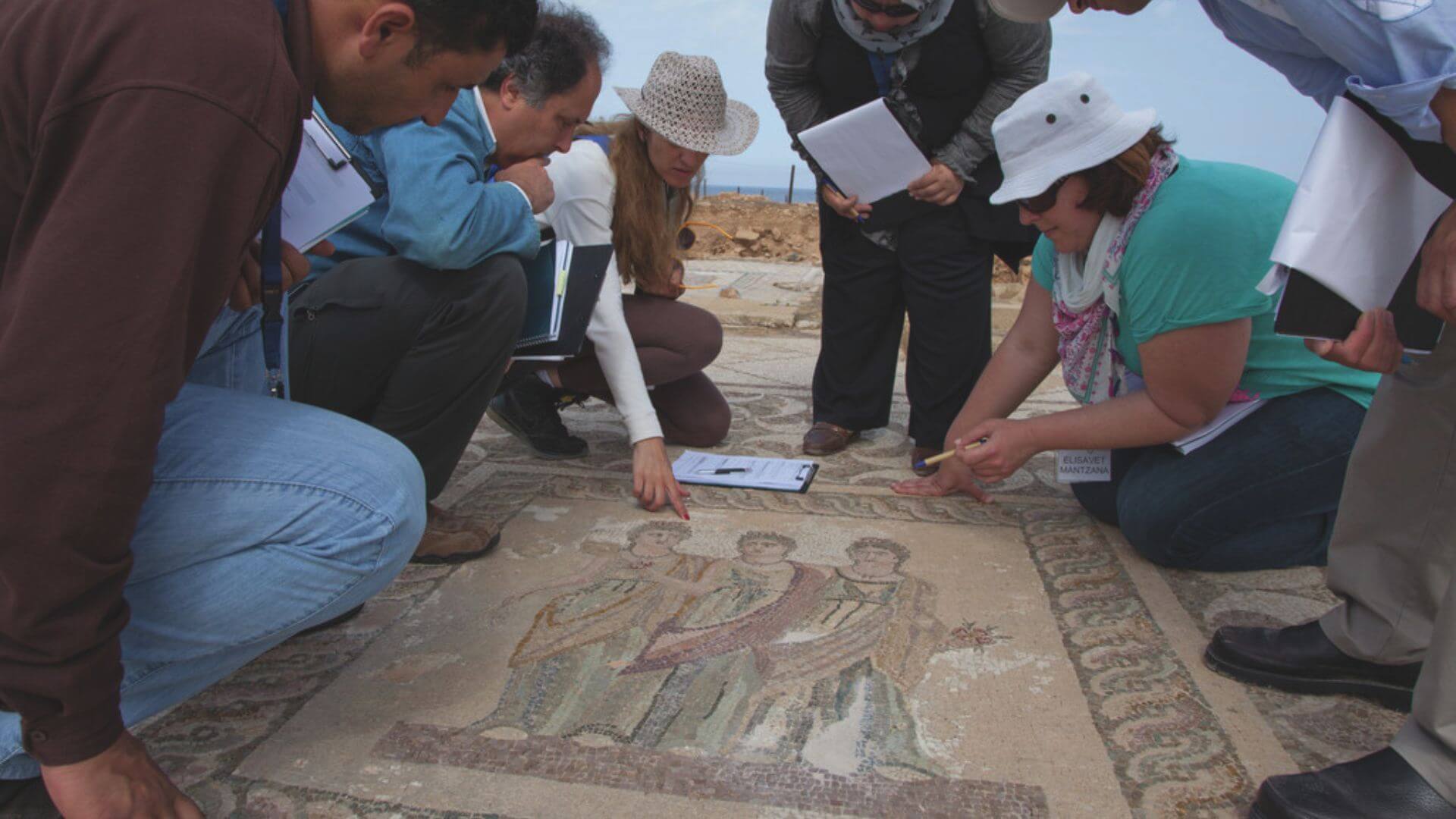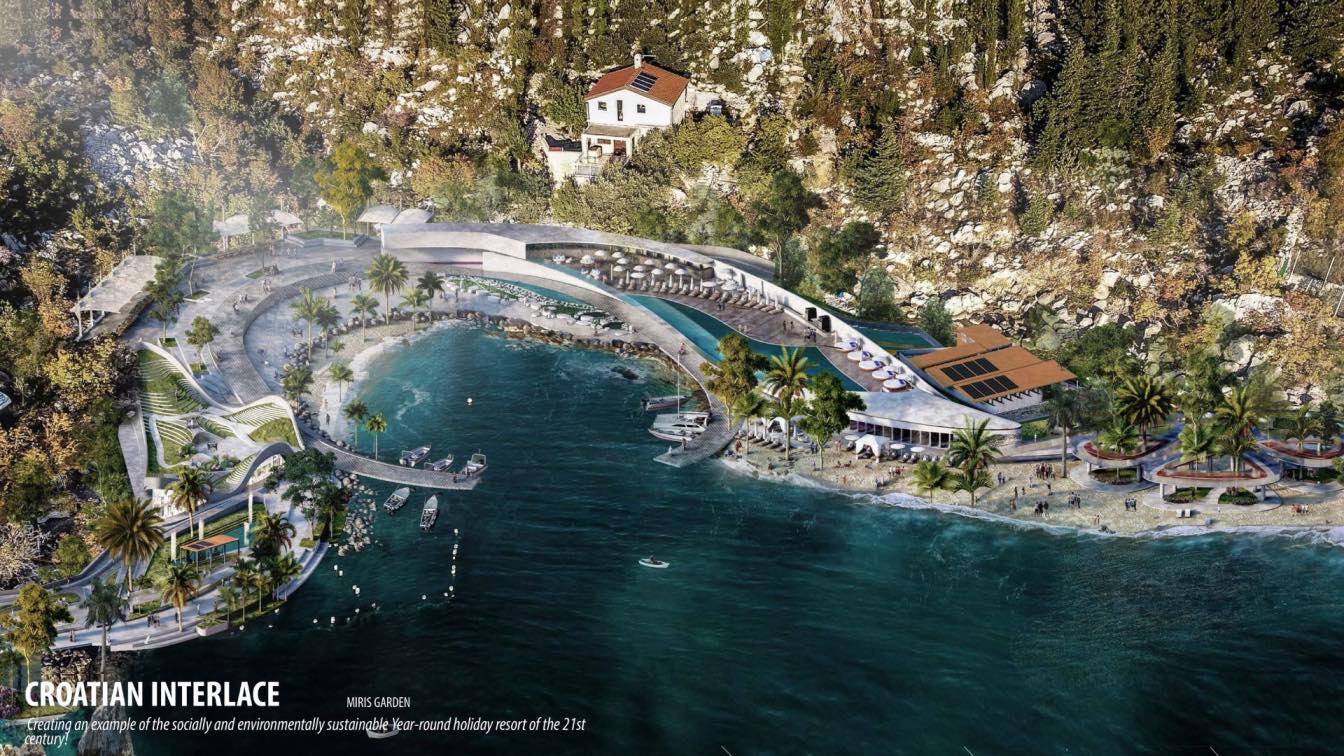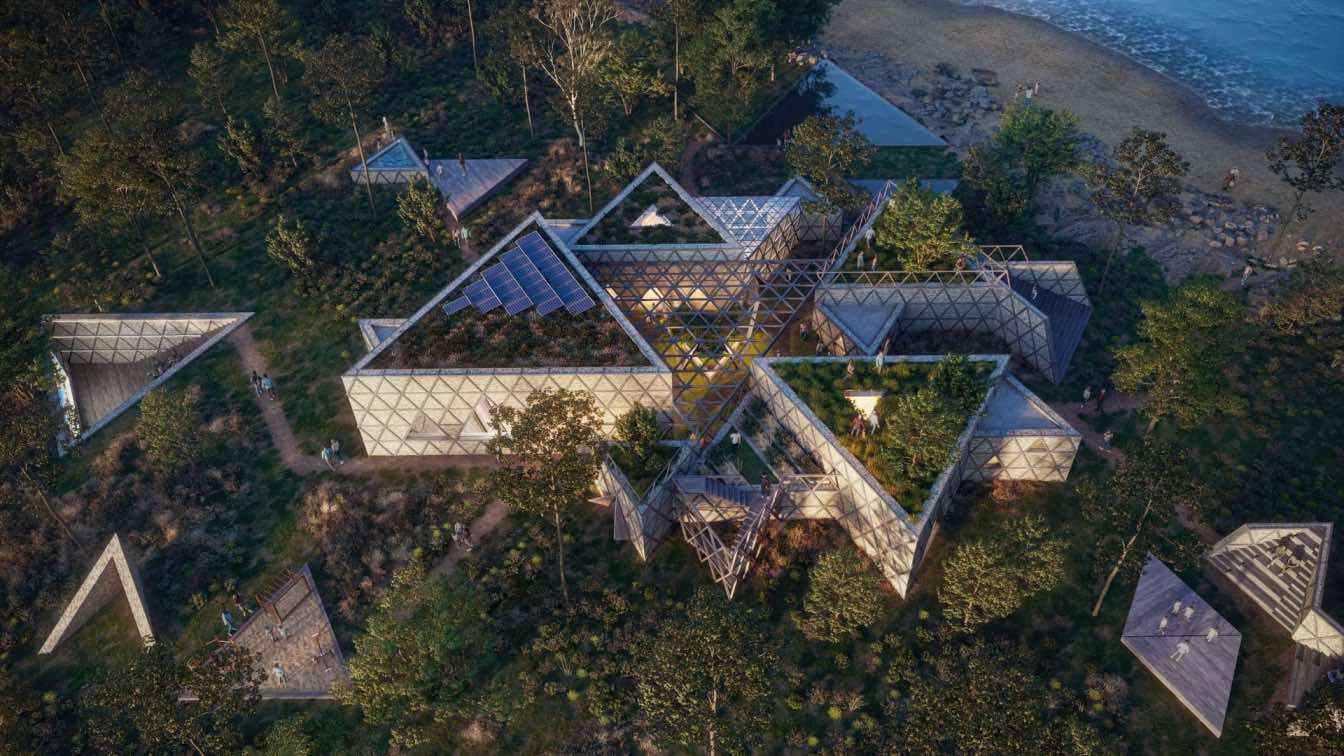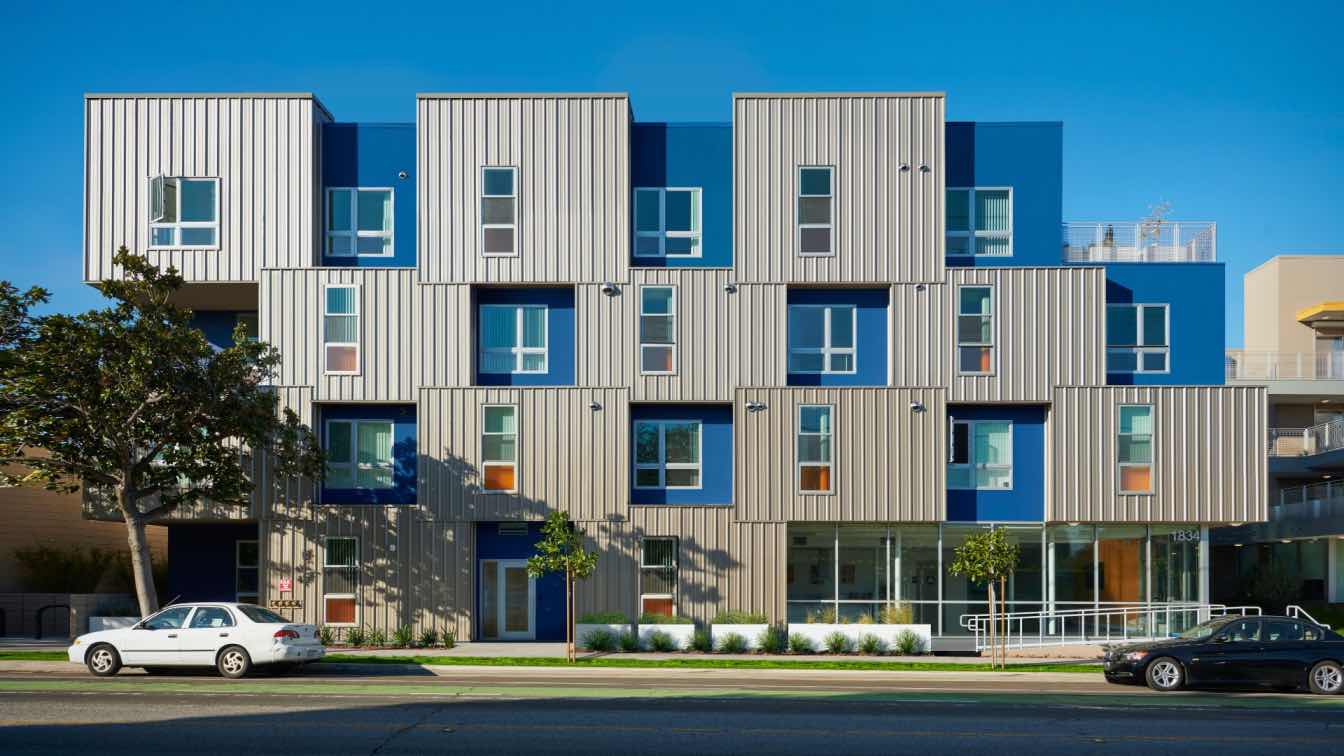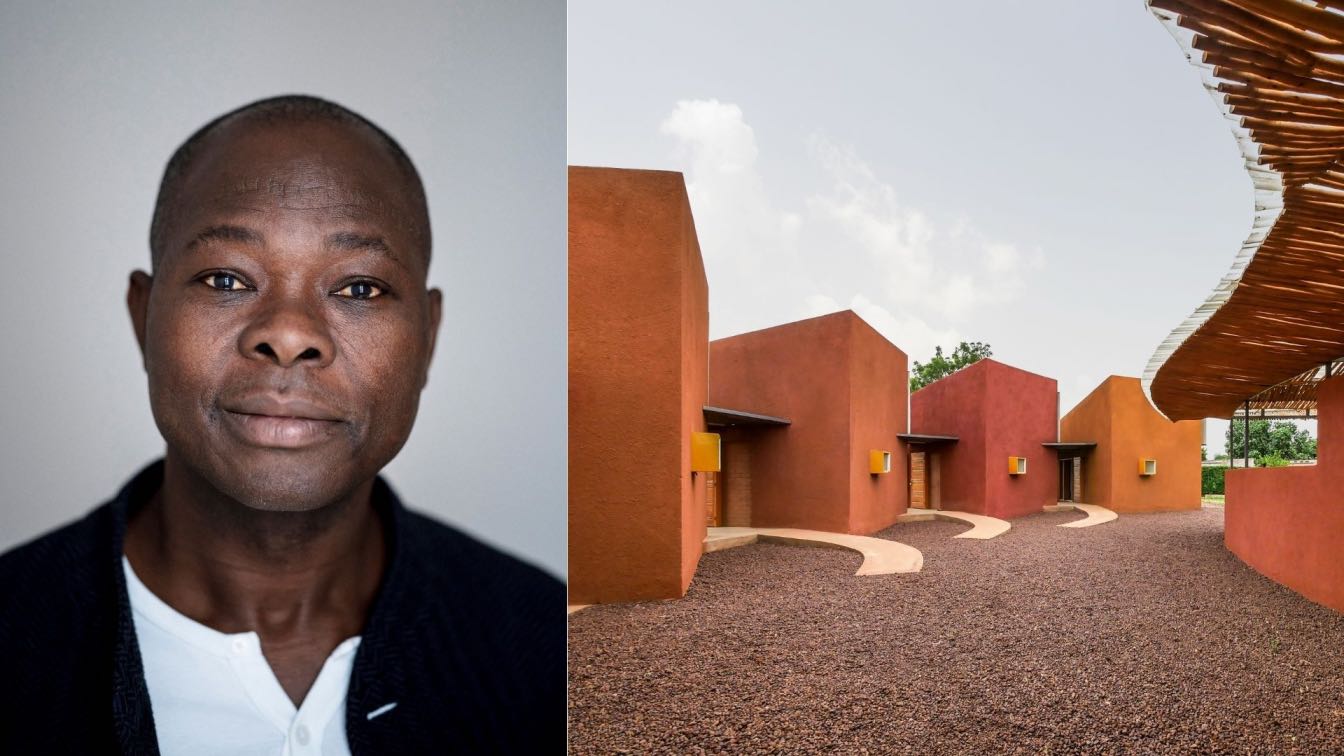These advanced MOSAIKON courses will train professionals for the long-term preservation of mosaics.
LOS ANGELES – The Getty Conservation Institute (GCI) and International Centre for the Study of the Preservation and Restoration of Cultural Property(ICCROM) have announced they will hold two advanced training courses in Jordan and Lebanon focused on the conservation of mosaics in the region.
These intensive trainings are among the final courses of the MOSAIKON initiative, a collaboration of the GCI, the Getty Foundation, ICCROM, and the International Committee for the Conservation of Mosaics (ICCM). Since 2008, MOSAIKON has trained over 200 conservation professionals from countries of the southern and eastern Mediterranean region, all of whom conducted research and model field projects as part of their training.
“MOSAIKON was created with the principal goal of promoting best practices for mosaic conservation at archaeological sites, museums, and storage facilities throughout the Mediterranean region,” said Jeanne Marie Teutonico, associate director at the GCI. “After over a decade of courses and field work, the initiative has established an extensive network of dedicated mosaic conservation professionals, all of whom we hope will share the knowledge and skill attained in their trainings to mentor future generations.”
Each course is taught by experts in the field to ensure the highest quality in theoretical and practical training.
“ICCROM is honoured to have helped regional professionals conserve and manage archaeological sites with mosaics through 14 years of MOSAIKON experience and ICCROM’s partnership through its ATHAR Programme,” said Zaki Aslan, Director of the Regional Centre for the Conservation of Cultural Heritage in the Arab World (ICCROM - Sharjah). “Despite this initiative coming to a close, our dedication to its mission and objectives, and supporting regional collaboration with Member States in the Mediterranean, will continue.”
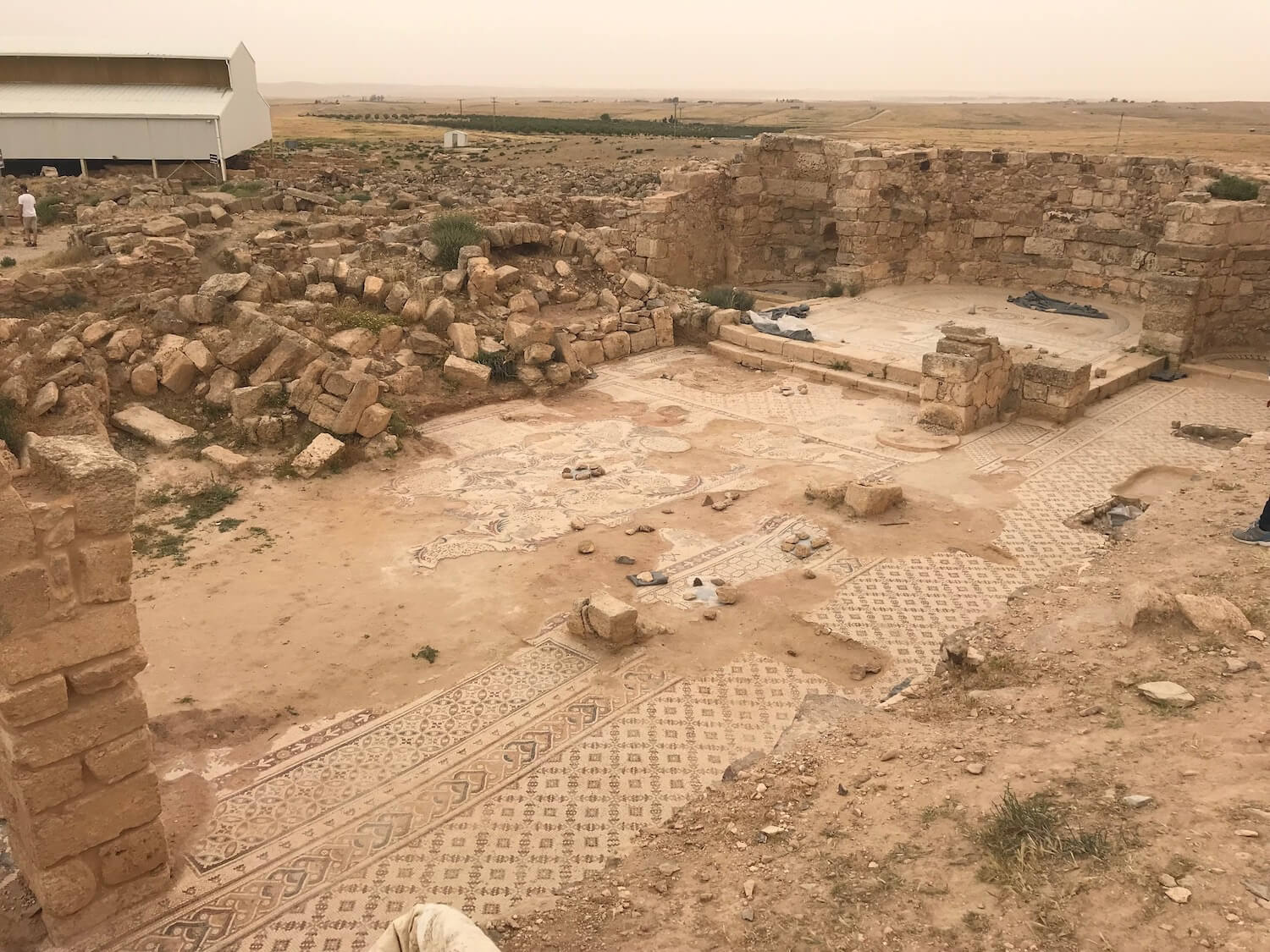 The site of Um-al-Rasas in Jordan, one of the open-air classrooms the course will be using to discuss shelters and reburial, photograph by Leslie Friedman
The site of Um-al-Rasas in Jordan, one of the open-air classrooms the course will be using to discuss shelters and reburial, photograph by Leslie Friedman
MOSAIKON Advanced Training on Preventive Conservation Measures for Archaeological Sites with Mosaics: Shelters & Reburial
September 18 to September 30, 2022
In partnership with GCI and ICCROM, the Department of Antiquities of Jordan will hold a two-week course based in Amman, Jordan that will focus on two strategic and sustainable approaches to conserving archaeological sites: the use of protective shelters and reburial. Using the archaeological sites of Jerash, Um al Rasas, and Madaba as outdoor classrooms, and taking advantage of the wealth of mosaic heritage in Jordan, course participants will learn these complex techniques that can help achieve more stable environments for fragile historic remains, such as mosaics.
“Increasing the local expertise of professionals capable of managing and conserving cultural heritage, particularly archaeological sites, is of the utmost importance as we face a multitude of challenges in the field such as rapid urban development, threats from climate change, and simply not enough resources,” said Professor Fadi Bala’wi, the Director General at Department of Antiquities of Jordan. “This course will help Jordanians and other heritage professionals from the region gain a better understanding of the complexities and opportunities of preventive practices such as sheltering and reburial, which are key to the preservation of our heritage.”
While previous MOSAIKON courses on archaeological site conservation covered a suite of topics, from documentation to site presentation, this course will provide more in-depth information on shelters and reburial as sustainable and preventive conservation practices. The two-week course will cover the decision-making process of these practices from feasibility to implementation, all within the context of a conservation management framework.
Eighteen participants from 10 countries—Albania, Algeria, Egypt, Greece, Jordan, Lebanon, Morocco, Palestine, Serbia, and Tunisia—were chosen to participate in the course. Most of the participants completed one of the three previous MOSAIKON courses held in Tyre, Lebanon in 2010, Paphos, Cyprus in 2014, and Volubilis, Morocco in 2017, or possessed similar training. Participants were chosen based on their performance in previous courses and their ability to apply and disseminate the approaches taught.
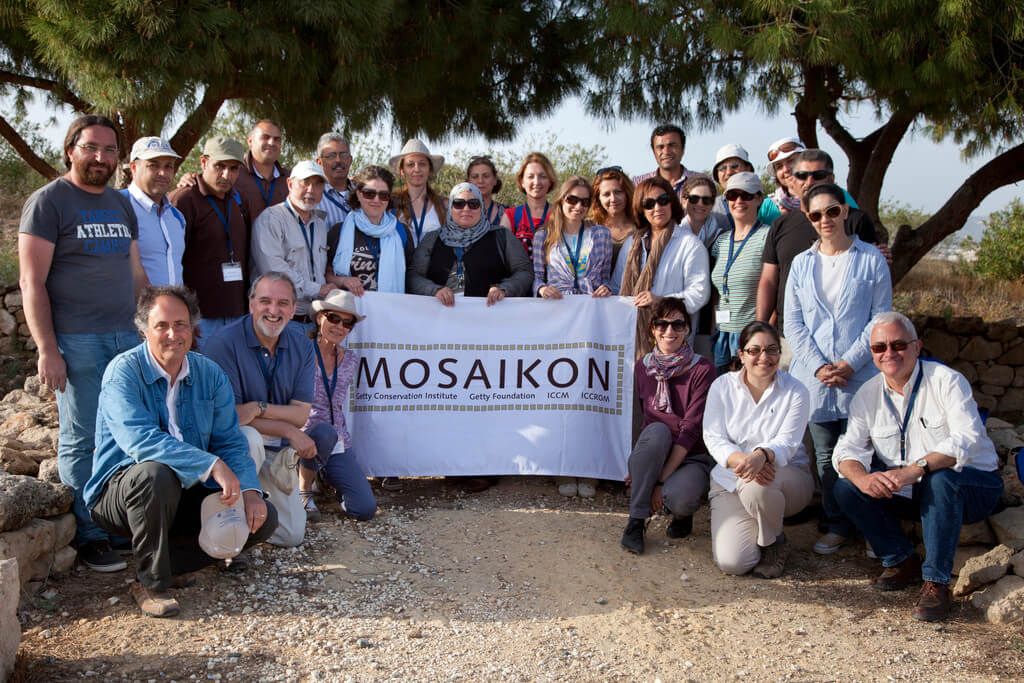 Group photo of participants and staff of a MOSAIKON course at the Paphos Archeological Park, Paphos, Cyprus, photograph by Scott S. Warren
Group photo of participants and staff of a MOSAIKON course at the Paphos Archeological Park, Paphos, Cyprus, photograph by Scott S. Warren
MOSAIKON Training Worksite for the Conservation of Mosaics in Storage
October 10 to November 4, 2022
In partnership with GCI and ICCROM, the Directorate General of Antiquities of Lebanon (DGA) will hold a four-week course based in Sidon, Lebanon that will focus on the conservation of mosaics in storage. This course will convene six DGA employees and five government employees from Libya and Jordan to enhance the capacity of authorities in the Middle East and North Africa to conserve important mosaic heritage. Lessons and practical exercises will be conducted using examples from a large collection of lifted mosaics from downtown Beirut that have been stored in Sidon since 1998.
“Mosaics are increasingly threatened by modern construction, looting, and a lack of trained professionals to support much needed conservation and maintenance work both onsite and in storage facilities,” said Sarkis Al Khouri, the Director General at Directorate General of Antiquities of Lebanon. “Lebanon was one of the first destinations for MOSAIKON courses and these trainings have greatly expanded our local expertise needed to manage ongoing issues.”
Participating conservation technician trainees will study methodology for documenting and conserving lifted mosaics using lime mortars to stabilize and re-back them, along with preventive measures to store them long-term. The training worksite complements an earlier MOSAIKON course held at the site of Volubilis, Morocco in 2018, in which trained technician-level practitioners learned similar techniques to document and conserve lifted mosaics left in storage for decades without adequate stabilization treatments.
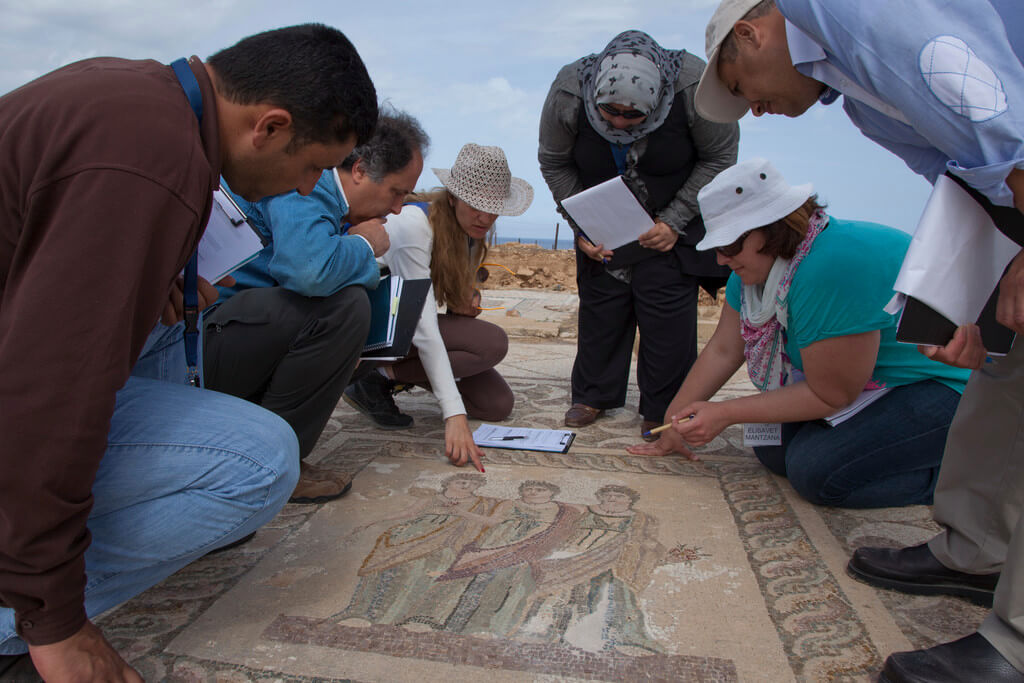 Thomas Roby, senior project specialist at GCI, advises participants in a MOSAIKON course conducting a condition survey exercise of the Three Oras Mosaic at the Paphos Archeological Park, Paphos, Cyprus, photograph by Scott S. Warren
Thomas Roby, senior project specialist at GCI, advises participants in a MOSAIKON course conducting a condition survey exercise of the Three Oras Mosaic at the Paphos Archeological Park, Paphos, Cyprus, photograph by Scott S. Warren
Getty is a leading global arts organization committed to the exhibition, conservation, and understanding of the world’s artistic and cultural heritage. Working collaboratively with partners around the globe, the Getty Foundation, Getty Conservation Institute, Getty Museum and Getty Research Institute are all dedicated to the greater understanding of the relationships between the world’s many cultures. The Los Angeles-based J. Paul Getty Trust and Getty programs share art, knowledge, and resources online at Getty.edu and welcome the public for free at the Getty Center and the Getty Villa.
The Getty Conservation Institute (GCI) works internationally to advance conservation practice in the visual arts—broadly interpreted to include objects, collections, architecture, and sites. The Institute serves the conservation community through scientific research, education and training, field projects, and the dissemination of information. In all its endeavors, the GCI creates and delivers knowledge that contributes to the conservation of the world’s cultural heritage.
ICCROM (International Centre for the Study of the Preservation and Restoration of Cultural Property) is an intergovernmental organization, headquartered in Rome, working in service to its Member States to promote the conservation of all forms of cultural heritage in every region of the world. For more than six decades, ICCROM has partnered with Member States to support them in safeguarding heritage within their borders and beyond. ICCROM-Sharjah is a regional conservation centre founded by ICCROM and the Government of the Emirate of Sharjah, the United Arab Emirates, where it has been based since its inception in 2012. ICCROM-Sharjah is a continuation of ICCROM’s ATHAR programme, launched in 2004, which dedicates its activities to the protection of cultural heritage in the Arab region and to broadening access, appreciation and understanding of its rich history.
The Directorate General of Antiquities (DGA) of Lebanon is a governmental department, under the country’s Ministry of Culture since 1993. The DGA encourages and supports cultural organizations and the creative arts in all its forms. It facilitates public access to cultural agencies including the creation of museums with the aim of safeguarding the national memory and disseminating the country’s heritage and culture to the public.

